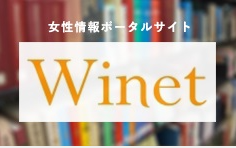International Cooperation
- HOME
- International Cooperation
- NWEC Global Seminar
- FY2018 NWEC Global Seminar: Promotion of the Advancement of Women - What Japan can learn from Iceland about Gender Equality?
NWEC Global Seminar
- Event Report
-
FY2018 NWEC Global Seminar: Promotion of the Advancement of Women - What Japan can learn from Iceland about Gender Equality?
Date:December 7th, 2018
Place:Shufu Kaikan Plaza f B2F Clarte /
On Friday, December 7th, 2018, the National Women’s Education Center of Japan hosted the FY2018 NWEC Global Seminar under the theme of“Promotion of the Advancement of Women – What Japan can learn from Iceland about Gender Equality?”at Shufu Kaikan Plaza f (Chiyoda-ku, Tokyo), where active discussions among over 100 participants from home and abroad took place.
The keynote speaker for Part I, Ms. Brynhildur Heiðar-og Ómarsdóttir, the Managing Director of the Icelandic Women’s Rights Association (IWRA), gave a comprehensively detailed report entitled “Creating a Gender Equal Future, Together! - Lessons from Iceland.” Ms. Brynhildur has been an advocate for gender equality monitoring legislation and government policies dealing with gender equality. IWRA is the oldest civic group established in 1907 to fight for women's suffrage, and has come a long way to reduce the gender gap. Today, IWRA is involved in a wide range of activities, from working in close cooperation with women participating actively in political parties to editing educational materials about gender equality used in high schools. Starting with the history of IWRA and a report on the activities the association has engaged in, Ms. Brynhildur gave a detailed presentation on various movements in Iceland that are about to achieve gender equality.
Regarding specific political movements such as gender equality action plans, parental leave, the equal pay standard that made it possible to build an equal society, she gave a clear conclusion that social change doesn’t come from legislative changes, but from political action. She then emphasized that without women organizing and demonstrating and running for office, nothing would change. She said that it is up to us, the voters, to demand changes and equality, since men in power don’t easily share power.
Referring to education, women's labor, and further correction of gender pay gap as future issues, she emphasized that equality is achieved only through efforts, and that there would be no advance without grass-root organizing. She delivered a strong message that the future of gender equality will be built through feminist education. She said that the strong women's movement worked as a major factor for making Iceland a more gender-equal county, and stated that it is only through education that we can change the world. The participants were deeply moved by this conclusion.
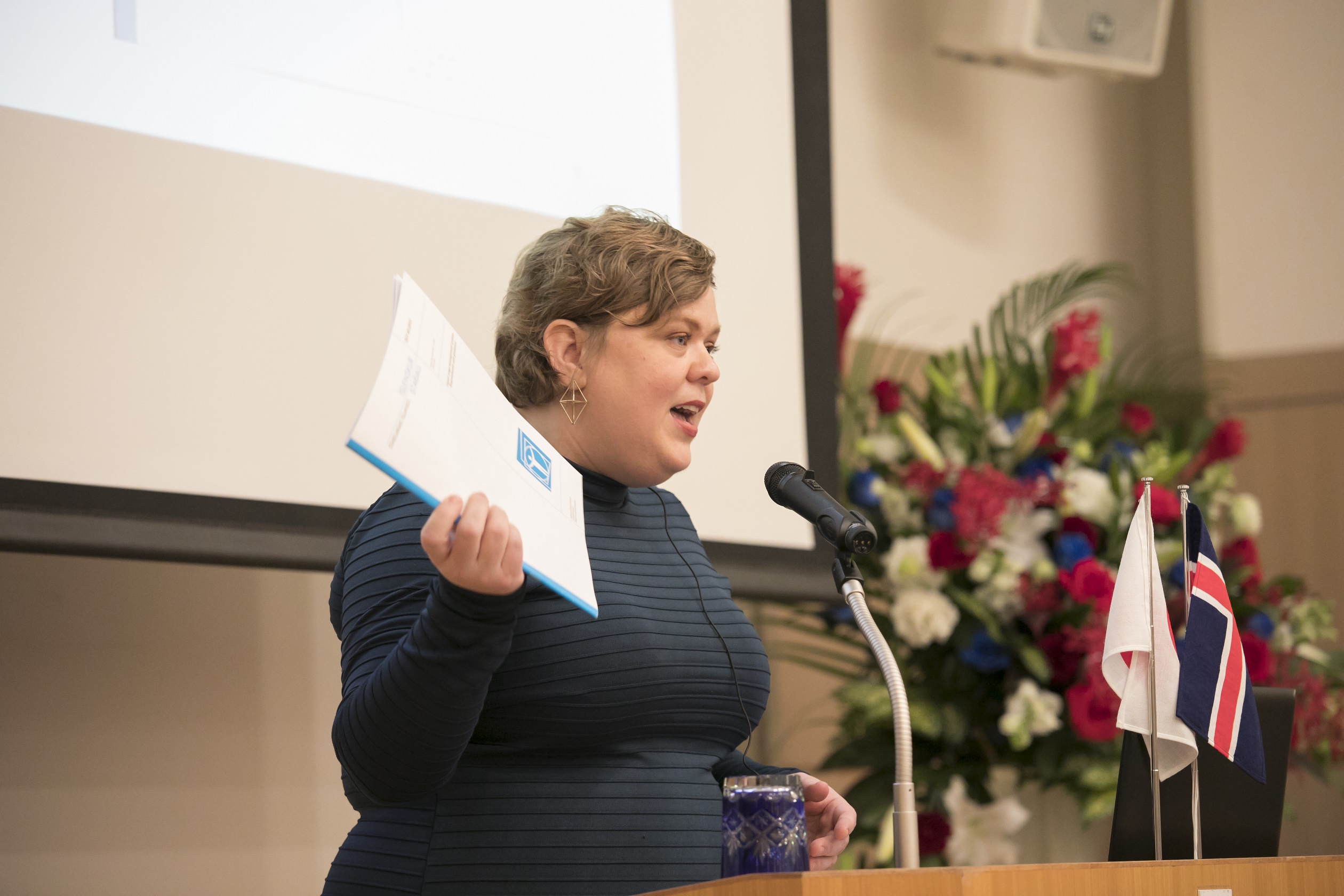 Part I Keynote Address (Ms. Brynhildur Ómarsdóttir)
Part I Keynote Address (Ms. Brynhildur Ómarsdóttir)
The Part II panel discussion, under the main theme of “Dialogue with Ms. Brynhildur – Striving Toward Gender Equality,” was an enthusiastic report and debate. The current state and the history of Iceland are highly suggestive to Japanese society, and especially, the following three themes were highlighted as issues to be addressed – gender equality in labor, women’s participation in decision-making, and gender equality for men. Three experts offered in-depth commentaries on specific situations and challenges.
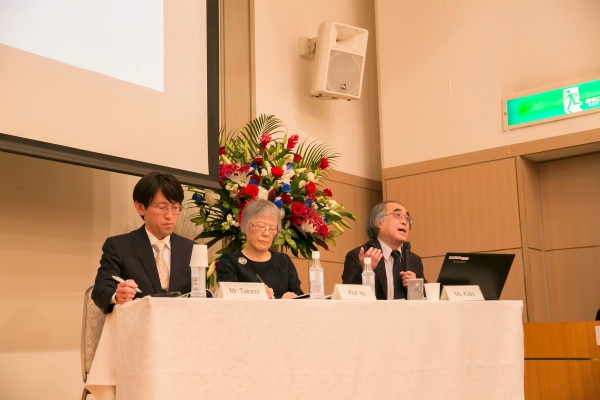 Part II Panel Discussion
Part II Panel Discussion
Mr. Tomohiro Takami, Researcher, Department of Labour and Economy, the Japan Institute for Labour Policy and Training, addressed the issue of gender equality in employed labor based on detailed data in the presentation entitled “For the Promotion of Women’s Participation and Advancement in Employed Labor – Issues Japan Should Address.” The main problem is the low ratio of women in managerial position. Laws and regulations are being prepared for gender quality, such as the Act on Promotion of Women’s Participation and Advancement in the Workplace (enacted in 2015), but Japan still has a long way to go. The ratio of women in managerial position is still low by international standards, and the gender difference in job experience in companies is quite large. Especially, it is clearly shown that less women experience corporate core duties and positions that lead to managerial positions. Then, why are there few female executives in Japanese companies? Reasons include a lack of women who have required knowledge and experience; women themselves do not wish to be in a managerial position; women do not meet the tenure required for a managerial position. Mr. Takami pointed out that work style reform with men involved is necessary in order to change the situation, and that women’s participation and advancement may progress in companies with no overtime work, shedding light on the direction for problem resolution.
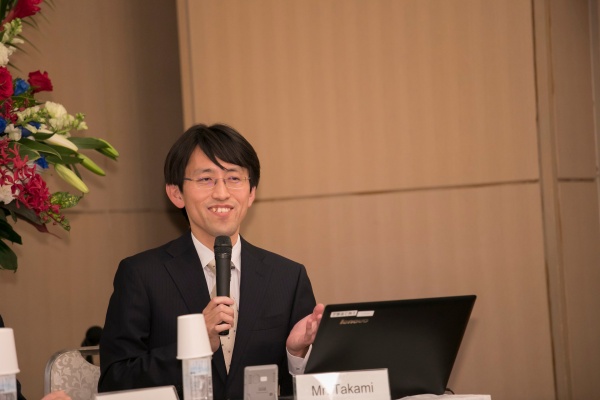 Mr. Tomohiro Takami
Mr. Tomohiro Takami
Regarding the second theme, “Issues Surrounding Women’s Participation in Decision-Making and Policies,” Ms. Kimiko Kubo, Managing Director of ICHIKAWA Fusae Center for Women and Governance, reported on the present situation of Japanese women’s participation in politics based on detailed data. In her presentation, she showed that the percentage of female Diet members is 10% which ranks the 162nd in the world, and that the majority of the local assemblies have only one or two female members, analyzing factors that impede women’s participation in politics. As a conclusion, she suggested the following five actions to encourage women’s participation in politics: (1) Raise political awareness (political education, sovereign education); (2) Experience (training); (3) Role models; (4) Use local women’s centers as a hub; and (5) Use the “promotion law” as a tool. At the end, she emphasized the need to let young women exercise leadership, let them play roles on an equal footing with elderly people to gain momentum, and open up a doorway to organizations to encourage active participation. A proposal made by Ms. Kubo who has been working on women’s participation in politics and promoting it strongly over many years, and her perspective on young women in particular, was highly suggestive.
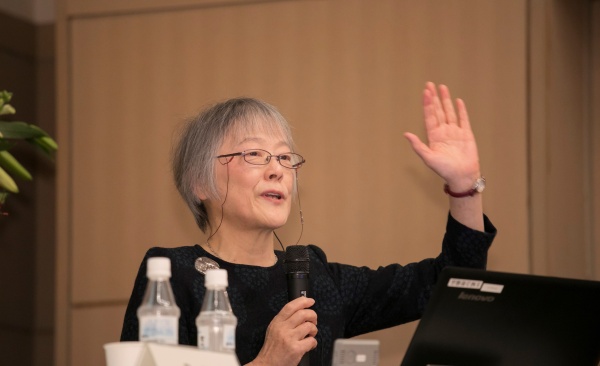 Ms. Kimiko Kubo
Ms. Kimiko Kubo
Prof. Kimio Ito, Professor Emeritus, Kyoto University, started his presentation “Gender Equality for Men and Boys in Japan” by pointing out the fact facing Japanese society that in 1970, Japan boasted the second highest female labor participation rate among the OECD countries, but, in 2000, Japan was overtaken by many countries and grew stagnant. He then analyzed the overall picture of the gender structure established at that time. He pointed out problems stemming from the fact that women’s potential abilities were not fully utilized while men were inflated – such as men’s long working hours; fixing of male-dominated labor practices; men being unable to achieve a happy feeling; women bearing a greater burden of domestic duties and childcare; escalation of women’s non-regular labor under poor working conditions. He also emphasized the need for gender equality policies for men while it is needed to further enhance the policies for women’s empowerment. Issues involved in gender policies for men include raising men’s awareness about gender equality; analyzing men’s problems; non-violence training for male perpetrators of sexual violence. On the other hand, men who are becoming aware of the contradictions underlying in the men-driven society are now addressing (1) Single father problems; (2) Fathering Japan campaign; and (3) Formation of White Ribbon Campaign Japan. Prof. Ito provided an update where a new big wave is about to arise and change the existing state of affairs.
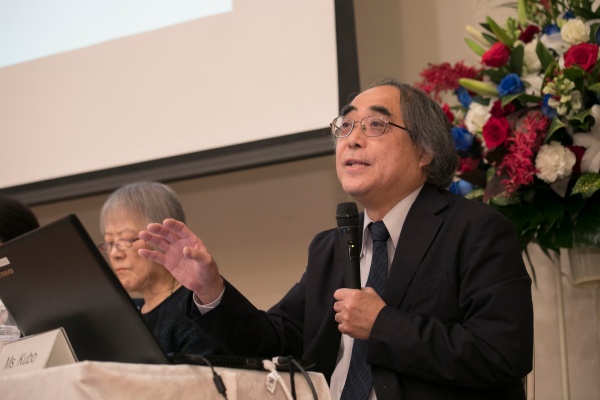 Prof. Kimio Ito
Prof. Kimio Ito
During the later discussion, a question raised by a Part II presenter about how Iceland corrected a pay gap was answered that it was achieved by tenacious labor-management negotiations and labor campaign, triggering more concrete discussions. A number of questions followed one after another from the floor, resulting in active discussions. Through the keynote address and discussions, the participants gained clear understanding about the patient efforts Iceland has made to achieve gender equality and the equal pay standard. Seminar made clear what is needed for Japan and what Japan should do for the future.
International Cooperation
- International Seminar
- FY2019 Seminar for Gender Equality Officers and Women Leaders in the Asia Region
- FY2018 Seminar for Gender Equality Officers and Women Leaders in the Asia Region
- FY2017 Seminar for Gender Equality Officers and Women Leaders in the Asia Region
- FY2016 Seminar for Gender Equality Officers and Women Leaders in the Asia Region
- FY2015 Seminar for Gender Equality Officers and Women Leaders in the Asia Pacific Region
- FY2014 Seminar for Gender Equality Officers and Women Leaders in the Asia Pacific Region
- FY2013 Seminar for Gender Equality Officers and Women Leaders in the Asia Pacific Region
- FY2012 Seminar for Gender Equality Officers and Women Leaders in the Asia Pacific Region
- FY2011 Seminar for Gender Equality Officer and Women Leaders in the Asia Pacific Region
- FY2010 Empowerment Seminar for Women Leaders in the Asia Pacific Region
- FY2009 Empowerment Seminar for Women Leaders in the Asia Pacific Region Final Report
- FY2008 Empowerment Seminar for Women Leaders in the Asia Pacific Region
- FY2007 Empowerment Seminar for Women Leaders in the Asia Pacific Region
- FY2006 Empowerment Seminar for Women Leaders in the Asia Pacific Region
- NWEC Global Seminar
- FY2025 NWEC Global Seminar: Addressing Technology-Facilitated Gender Based Violence (TFGBV): Approaches to Eradicate the Invisible Harm
- FY2024 NWEC Global Seminar: Gender Equality and Care
- FY2023 NWEC Global Seminar: Gender Mainstreaming & Strengthening Institutional Mechanism with Gender Perspective
- FY2022 NWEC Global Seminar: Does Digital Technology Advance Gender Equality?
- FY2021 NWEC Global Seminar: Combating Gender-Based Violence – “Building Back Better” from the Covid-19 Crisis
- FY2020 NWEC Global Seminar: Covid-19 and Gender
- FY2019 NWEC Global Seminar: Gender and Media
- FY2018 NWEC Global Seminar: Promotion of the Advancement of Women - What Japan can learn from Iceland about Gender Equality?
- FY2017 NWEC Global Seminar: Promotion for Advancement of Women Lessons from Germany
- FY2016 NWEC Global Seminar: Promotion for Advancement of Women –Lessons from Europe
- FY2015 International Symposium: Gender Equality and Women's Empowerment
- FY2014 International Symposium: Keys to Diversity and Women's Leadership
- FY2013 NWEC International Symposium:Gender Equality for Men
- FY2012 NWEC International Symposium:To Make a Society without Violence against Women a Reality
- FY2011 NWEC International Symposium
- FY2010 International Forum for Women's Empowerment
- FY2009 International Forum for Women's Empowerment
- FY2008 International Forum for Women's Empowerment Final Report3
- FY2008 International Forum for Women's Empowerment Final Report2
- FY2008 International Forum for Women's Empowerment Final Report1
- Cooperation with JICA
- FY2025 Knowledge Co-Creation Program (KCCP): "Promotion of Global Networking on Anti-Trafficking in Persons"
- FY2025 Knowledge Co-Creation Program "Eradicating Sexual and Gender-Based Violence (SGBV)"
- FY2025 Knowledge Co-Creation Program: Bangladesh “Strengthening Capacity to Address Gender-Based Violence"
- FY2024 Knowledge Co-Creation Program on "Promotion of Global Networking on Anti-Trafficking in Persons"
- FY2024 Knowledge Co-Creation Program "Eradicating Sexual and Gender-Based Violence (SGBV)"
- FY2023 Knowledge Co-creation Program "Promotion of Networking among ASEAN Countries on Anti-Trafficking in Persons”
- FY2023 Knowledge Co-Creation Program "Eradicating Sexual and Gender-Based Violence (SGBV)"
- FY2022 Knowledge Co-creation Program "Promotion of Networking among ASEAN Countries on Anti-Trafficking in Persons”
- FY2022 Knowledge Co-Creation Program "Eradicating Sexual and Gender-Based Violence (SGBV)"
- FY2021 Knowledge Co-creation Program "Promotion of Networking among ASEAN Countries on Anti-Trafficking in Persons”
- FY2020 Knowledge Co-creation Program "Promotion of Networking among ASEAN Countries on Anti-Trafficking in Persons”
- FY2019 Knowledge Co-creation Program "Promotion of Networking among ASEAN Countries on Anti-Trafficking in Persons”
- FY2018 Knowledge Co-creation Program "Promotion of Networking among ASEAN Countries on Anti-Trafficking in Persons”
- Issue-specific Training “Seminar on Promotiom of Networking among ASEAN Countries on Anti-Trafficking in Persons”
- Basic Information-Gathering Survey/Workshop Seminar on the Economic Independence for Women in Central America and the Caribbean (El Salvador/Dominican Republic)
- Regional Gender Seminar in Central and South America
- 2015 Issue-specific Training "Seminar on Promotion of Networking among Asian Countries on Anti-Trafficking in Persons"
- Seminar on the Promotion of Education for Girls and Women II
- International Conference/International Exchange
- Visit by Professor Hilado from the University of the Philippines Visayas
- Online meeting with Seisen International School elementary students
- Visitor: Mansfield Fellows
- Visitor:JICA Knowledge Co-Creation Program (KCCP) on "Women's Empowerment through Business for Central American Integration System (SICA) Member Countries"
- The 68th Session of the Commission on the Status of Women
- Visitor: Madam Sustjie Mbumba, First Lady of the Republic of Namibia
- Workshop of commemorating the donation of the Beate Shirota Gordon archive materials
- Meeting with Korean Women’s Development Institute (KWDI)
- The Coalition of Finnish Women's Associations (NYTKIS) Secretary General Ms. KAKKOLA’s Courtesy Call to Foreign Minister KAMIKAWA
- The Coalition of Finnish Women's Associations (NYTKIS) Secretary General Ms. KAKKOLA’s Japan Visit Program
- The 67th Session of the Commission on the Status of Women
- NGO CSW67 Forum
- Webinar with Korean Women’s Development Institute (KWDI)
- The 66th Session of the Commission on the Status of Women (Hybrid format)
- Online meeting with international graduate students from the Appropriate Technology course at the University of Tsukuba
- The 65th session of the Commission on the Status of Women
- Lecture "The Beate Sirota Gordon Archives at Mills College"
- Participation in 2nd AGenT
- The 64th session of the Commission on the Status of Women
- Dr. Wang from National Taiwan University visits NWEC
- Japan Network of Women Engineers and Scientists and The Japan Inter-Society Liaison Association Committee for Promoting Equal Participation of Men and Women in Science and Engineering: 9th Japan Korea China Women Leaders Forum for Science & Technology
- Researcher from the KWDI visits NWEC
- Visit by a delegation from the Socialist Republic of Vietnam Ministry of National Defense
- Briefing on the Reykjavik Index for Leadership
- Women's Archives Center Exhibition "Beate Sirota Gordon and gender equality in Japanese Constitution"
- Visit from the Guangxi Women’s Federation
- Participation in the 63rd Session of the Commission on the Status of Women
- 7th Global Forum on Gender Statistics
- FY2018 International Symposium hosted by Korean Institute for Gender Equality Promotion and Education “Gender Equality at Schools”
- Visit from All-China Women’s Federation(ACWF)
- Participation in the 62nd Session of the Commission on the Status of Women
- The 14th KIGEPE International Symposium “Empowering Women’s Leadership: expanding influence and innovation”
- Participation in the 61st Session of the Commission on the Status of Women
- Visit from the Batis Center for Women
- 2011 Asia Women Eco-Science Forum (a forum of science and engineering leaders in Japan, China and Korea)
- The 60th Session of the Commission on the Status of Women
- The 59th Session of the United Nations Commission on the Status of Women
- The 58th Commission on the Status of Women
- The 57th Session of the United Nations Commission on the Status of Women
- International Symposium: Gender Awareness Education for Sustainable Development
- Thirtieth Anniversary Programs
- Attendance at the Ceremony Commemorating the 25th Anniversary of the Korean Women’s Development Institute (KWDI)
- Japanese-Filipino children (JFC)* from the Philippines-based NGO “DAWN” visit the Center
- Visitors from Abroad to NWEC
- Research report on Multicultural Family Support in South Korea
- Workshop on Gender and Education: Life-long Learning for Women’s Empowerment
- Lecture Delivered by a Visiting Researcher
- Connections: Bringing Together the Next Generation of Women Leaders in Science, Technology, Engineering and Mathematics
- Conclusion of Memorandum of Understanding on Exchange and Cooperation with the Ministry of Women's Affairs, Royal Government of Cambodia
- Visit to Japan by the Minister of Women’s Affairs of the Royal Government of Cambodia
- KIGEPE Delegation Visit
- Officials of Ministry of Information and Communications of the Socialist Republic of Vietnam visited NWEC
- The 56th Commission on the Status of Women
- Dr. Barker's visit
- Multidisciplinary Intellectual Exchange for Women Leaders from the United States, Japan, South Korea and the Philippines
- Courtesy visit to University of Hawai`i
- Delegation of Board for the Advancement of Women, Ministry of Finance of the Socialist Republic of Vietnam visited NWEC
- Visit Korean Women's Development Institute (KWDI)
- Report on Participation in the 5th World Social Forum on Migration
- A group led by the Vice President of the Korean Women's Development Institute visited NWEC
- A disaster management specialist from India visits the Center
- Visit to the Korean Institute for Gender Equality Promotion & Education (KIGEPE) and others
- Secretary of State, Ministry of Justice, Kingdom of Cambodia visited NWEC
- Research conducted in the Republic of the Philippines
- Research on the Comparative Study of the Gender Equality Policy in Southeast Asian Countries in the Kingdom of Cambodia
- Ochanomizu University and A Canadian Women’s Study Researcher visited NWEC
- Aigyung Yang, Research Fellow and Former Director of Strategy Board for Women Friendly Policies of the Korean Women's Development Institute (KWDI) Visits NWEC
- Delegation of the Ministry of Defense of the Socialist Republic of Vietnam visited NWEC
- Delegation from the Women and Development Center, of the Vietnam Women's Union, Visited NWEC
- The "7th Asia-Pacific Forum on Development and Gender" was held in Seoul, South Korea
- HOME
- International Cooperation
- NWEC Global Seminar
- NWEC Global Seminar
- FY2018 NWEC Global Seminar: Promotion of the Advancement of Women - What Japan can learn from Iceland about Gender Equality?



